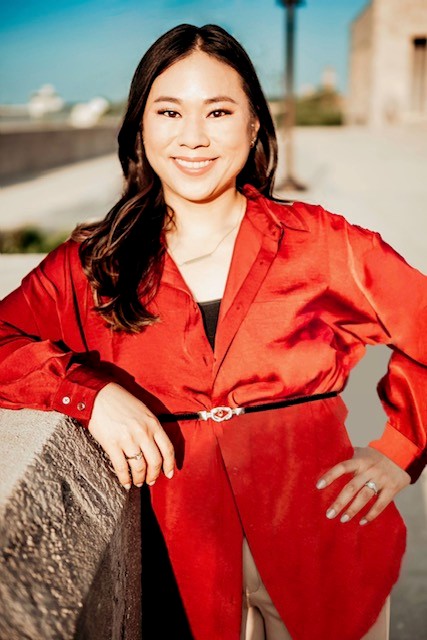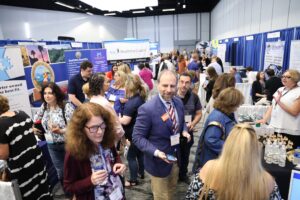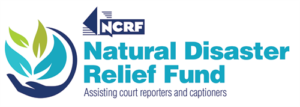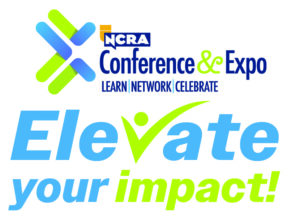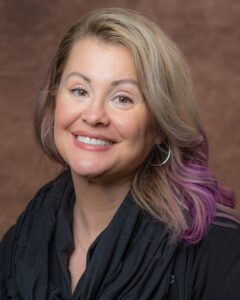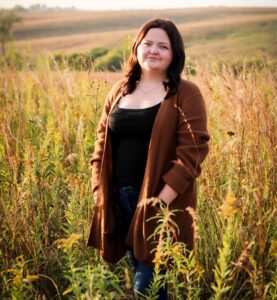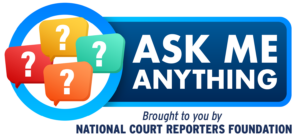Like so many of the students we spotlight here, Angie Podge, RSR, of Kansas City, Mo., had already completed a four-year degree and started a career when she felt the pull of something different. She heard about court reporting from an instructor. “I was fascinated from my first class,” she says. “It was like a puzzle I had to solve and will continue to solve for years to come, and from the moment I learned the steno alphabet, I was hooked.”
UTS | What do you love about stenography?
AP | I love stenography because it’s like a superpower that not a lot of people have. I love being able to glimpse into the lives of other people. I love learning about new topics. I also love the stenography community and all the wonderful people I’ve been able to meet who help me get through days when I don’t love steno so much.
UTS | Do you think court reporters have been misrepresented on screen? How so?
AP | I think court reporters have been misrepresented and underrepresented. When I watch shows set in a courtroom, I immediately start searching for the court reporter like I’m playing Where’s Waldo. Most of the time I don’t see them. I get really excited when I do see them, but it shouldn’t be so uncommon that it makes me excited. They should be as common as the judge and attorneys and court clerk and bailiff. And when I do see them on TV, I still see them using paper machines which makes it seem like the profession is antiquated and on the brink of irrelevance. I would love to watch a show where the court reporter is either the main focus or at least a supporting actor. How fun would it be to watch something like The Office where it’s set in a courthouse?
UTS | What is your favorite legal movie or TV show?
AP | I love all the legal shows from Ally McBeal back in the 90s to more recent shows like How to Get Away with Murder, Lincoln Lawyer, Better Call Saul, Suits, and Your Honor. Lately, I’ve been watching Judge Judy more frequently as I warm up to practice, and on my list to watch is Extraordinary Attorney Woo.
UTS | How did you first get the idea of being a court reporter? Did you have another career before you started court reporting school?
AP | I graduated from the University of Missouri with a degree in international business. Post-college, I took a job in sales management. I knew this wasn’t what I wanted to do forever, and my dad had always pushed me to pursue further education but getting a master’s degree didn’t interest me. Fast forward a few years and I was at a point in my life where certain pieces fell together, and I felt I could accomplish anything, and I felt ready to be challenged when a court reporting instructor told me about the court reporting profession. I thought about my dad wanting me to continue schooling for something greater and decided to give it a try. I was fascinated from my first class; it was like a puzzle I had to solve and will continue to solve for years to come, and from the moment I learned the steno alphabet, I was hooked.
UTS | What is the best advice you’ve been given so far?
AP | I often hear court reporters talk about the importance of speaking up for themselves and for the record. I think this is valuable advice, even as a student. I have found myself in situations where I didn’t speak up for myself and it left me in a cycle of self-doubt. I’ve learned that if there is something you need, you need to speak up for yourself. As a student that may be switching schools or asking for help and guidance, and as a reporter that may be asking everyone to speak one at a time or asking for a break when you need one.
UTS | If you were to go to a high school career fair to recruit students, what would you say to them about a career in court reporting and captioning?
AP | I would tell them to at least put it on their radar. I didn’t know about court reporting until I was 28. Not a lot of people, especially educators, emphasize the potential of learning a trade. They’re all so focused on students going to four-year colleges that anything else seems less than. But if there are people like me who love legal shows and want to watch things play out and want to continue being an observer rather than an active participant, then they should know there is a different career option they can pursue. One where the cost of education is more affordable, where there is high job demand, where there is the option between working independently or more of a traditional 8-5, and the option between freelance, court officialship, and captioning.
UTS | What do you do when you aren’t studying?
AP | When I’m not studying, I like going on trips, doing something active, grabbing dinner with a friend, watching TV, reading a book, or completing a jigsaw puzzle.
UTS | Is there anything else you would like to share about yourself?
I’m a resident of Kansas City, Mo., and I’m enrolled at SimplySteno. I recently earned my RSR and I’m working towards earning my RPR so I can certify in my state. Throughout this journey, I had a lot of self-doubt whenever things were tough. Believing in myself was almost harder than the dictations themselves. But I’m glad I stayed the course and will continue until I’ve earned my RPR and beyond. As my favorite Kansas Citian, Ted Lasso, says, “It may not work out how you think it will or how you hope it does. But believe me, it will all work out.” And to quote Ted one more time, if you’re a student reading this and you’re tired and you’ve failed yet another test, just think of the happiest animal on earth: “It’s a goldfish. It has a 10-second memory. Be a goldfish.” Let’s all keep swimming like a goldfish to the finish line.
Missed previous issues of Up-to-Speed? Access them here.
